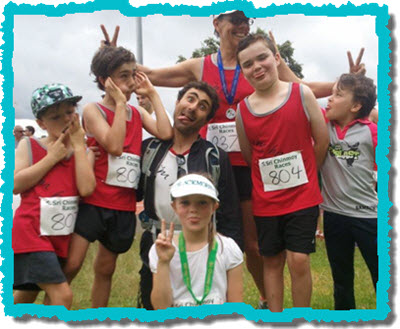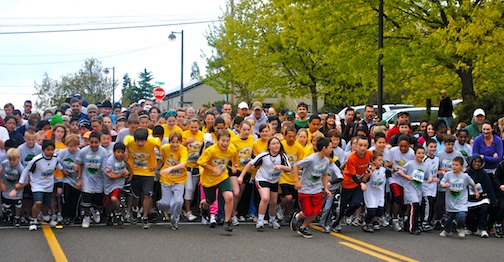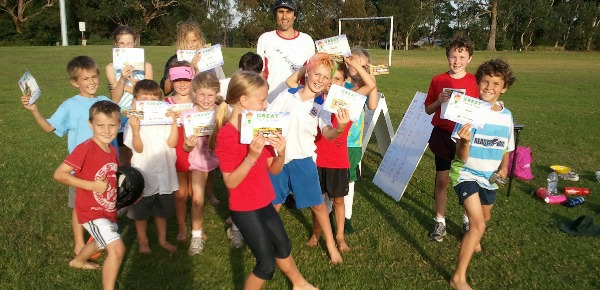Good Sports Parents Don’t Stuff Up the Car Trip Home
In the US, about 20 million kids register for competitive sports each year. By the time they are 13, just 30% of those kids are still playing sport. And the really sad thing about the other 70%, is that they will never play sport again. That is, not ever.
Whilst I don’t have figures for Australia, anecdotal evidence certainly points to a large number of kids (especially girls) dropping out of sport and physical activity in their early teens. That’s here, in Australia, where we have one of the best all round climates for outdoor sport in the world.
So how do we keep our kids involved in sport into adulthood?
Kids Stop Playing Sport When it Stops Being Fun
According to research, the number one reason kids drop out of sport is because it’s not fun. Very reasonable. Most adults don’t choose to do things which they don’t find fun. So why would kids be any different? The research, conducted by George Washington University, showed the top 6 things which made sport more fun for kids were
- Playing your best
- When coach treats player with respect
- Getting playing time
- Playing together well as a team
- Getting along with your teammates
- Exercising and being active
Further down the list were things such as
- Winning (#48)
- Playing in tournaments (#63)
- Getting medals or trophies (#67)
- Getting pictures taken (#81)
Take another look at those lists. Playing your best was the number one factor which kids felt made sport fun. Winning (which many of we adults think rocks) ranked only 48th on the list of factors that make sport fun for kids. And that’s what it should be about. Kids sport should be fun for kids, not a competition between parents.
So if we want to keep kids playing sport well into adulthood, we need to make sport fun. Much of making sport fun comes back to the parents. Parents are pretty involved in kids sport these days in Australia. I wonder if sometimes parents don’t have just a little too much invested in their kids’ games.
Best Coaching Exercise Ever
A couple of years ago, I coached an under 10’s soccer team. Whilst I was reading up about coaching, I came across an exercise which I thought was absolutely awesome. It went something like this.
- Get all the parents together.
- Give half of them orange bibs, half of them green bibs.
- Put them on the soccer field.
- Have all the kids stand around the outside of the field, with instructions to help their parents play, by yelling out where they should be on the field, what they should be doing with the ball, etc. Tell the kids to keep giving them helpful instruction, and to make sure you yell out loud so their parents can hear them.
- Blow the whistle to start the game
- See how well the parents play when they are constantly being told what to do and not given a chance to think for themselves.
9 Ways to Be a Good Sports Parent
# 1. Give your child some space
When was the last time you stood over your child in a maths exam and cheered every time they carried the one, or grimaced when they made a mistake? When was the last time you gave them step by step instructions on how to do their homework, without giving them a chance to figure it out for themselves? I’m betting the answer here will be never, or at least not very often. With their school work, we trust them enough to give them the chance to figure things out on their own. Then we give them help if they ask for it.
I’m not sure why this is, but with sport, some parents simply can’t resist the temptation to tell their kids what to do, where to be, who to mark, when to pass the ball, when to take a shot. We’ve all heard “that parent” on the sideline. What many of us don’t realise is that we do it ourselves, even if it is at a much calmer level than “that parent”. Mostly, our “help” is well meaning, but every time we tell our kids to “have a shot” “pass the ball” “mark a player” we are depriving them of the opportunity to develop their strategic thinking.
The reality is, if your child could make a play down the sideline, or read the play and be in position to intercept the ball from the attacking team, or if they could have scored the goal, won the race, passed the ball…they would have! There’s little point telling your kids to “run faster” or “try harder”, or “use the space”. It’s a bit like telling them to be taller.
If you really want to help your child develop their skills, keep in mind that the heat of the moment is not the best time to assimilate new information. Leave the coaching to the coach, and show your kids you enjoy watching them play, not watching them be outstanding. Cheer them on, shout out “Go Thunder” (if their team name happens to be “Thunder” that is), but don’t act like your kids are playing sport for your entertainment. If you find you’re screaming like a crazed Sea Eagles fan at Brookie Oval on a Friday night, you might need to take step back so that your child (and everybody else’s for that matter) can enjoy the game.
#2. Trust the Coach
In order for you to trust your child’s coach, you need to find out a bit about them. You can ask them directly about their coaching philosophy. Ask them if they plan to give all kids equal time on the field, what’s their aim for the season, what sort of things will the kids be doing at training?
Many of the coaches you’ll come across, particularly when your kids are young, will simply be the parent who has been good enough to put their hand up, so don’t bombard them with questions the minute you meet them. They may not have thought about it too much themselves when they first start out. But it is important to find out about the coach so that you can trust that they will develop your children’s love of sport, not crush it. So make it your business to engage the coach in conversation so that you can learn about them, and they can learn about you and your child. Make sure you approach the conversation in a non-judgmental manner.
Observe the coach at training and at games. If their values don’t match with yours, talk to them. I’ve heard of cases where parents don’t feel they can call the coach out on inappropriate behaviour because they don’ want to rock the boat and have their kids singled out, but it is NEVER ok for coaches to swear at kids or be generally abusive towards them to “toughen them up”. People like that have no place coaching our kids.
#3. Give the coach some space
Most coaches will appreciate you giving them space to train your kids. Once you’ve established that you’ve entrusted your child’s athletic development to someone who is worthy of that trust, keep away from the pre-game and half time huddles. Hand your child over to the coach for the duration of the game, and stay out of it, unless there is a real reason for you to be involved. Don’t criticise the coach in front of your kids. The same goes for the referee and other match officials as well! If you have an issue with the coach, take it up in private.
Try not to be the only person who has a significant influence in your kid’s life, because there will be a time when they will need to learn something that you won’t be able to teach them. Gift your children a good relationship with a great coach, which you have little part in.
#4. Know That it’s Okay for Your Kid to be a Ball Hog
It frequently happens in the younger age groups which are not graded, that there are one or two outstanding players on the field or court. Parents of these outstanding players are often tempted to tell their kids to pass the ball, not wanting it to appear that their child is being a ball hog. Whilst developing good passing skills is important, so is developing the ability to dribble and control the ball in an individual play. Kids need to be able to develop the confidence to make a play themselves. Leave it to the coach to decide if someone is being a ball hog. And remember, it may not be that the child is deliberately trying to hog the ball. Awareness of where other players are on the field comes to kids at different developmental stages, so it just may be the child doesn’t know where to pass the ball, or how to get a pass away.
#5. Make Learning More Important Than Winning
Feeling outside pressure to win doesn’t do a lot for our children’s enjoyment of sport. If they can view each game as an opportunity to learn more about the sport, and more about how they play it, it takes the pressure off a bit. I’m not saying kids shouldn’t want to win. There’s nothing the matter with a child being competitive, but your enthusiasm for your child’s victory should not be greater than theirs!
As a sports parent, it’s your job to remind your child that if they love the sport, and devote themselves to the love of that sport, the wins and losses will take care of themselves. In other words, life is a journey, not a destination. If you really love the sport, it won’t matter so much if you win or lose.
#6. Remember It’s Not About You
Remember your child’s sporting success or failure is their success or failure. If you find yourself saying “we scored three goals today” or “we played poorly today”, might be time to take a look at just who it is that’s playing the game. Unless you hold an official position on the team such as coach or manager, you’re not part of the team. You don’t win, lose, play well, score a goal, need to improve your positional play. You are not part of your child’s sporting team, so try to use language that reflects that
#7. Don’t Make Your Kids’ Sport a Contest Between Parents
If you have kids who play sport, at whatever level, you’re going to be spending a bit of time watching it, and you’ll enjoy it more if you’re not comparing your child to others. Proving to yourself and anyone else who will listen, that your child is a better athlete than the next kid, doesn’t prove you’re a better parent, or your child is a better person, or that they are going to have a better life! There is no evidence that shows elite athletes are any happier in life than average athletes.
Twenty years down the track, it’s unlikely to matter who won the under 10 netball grand final. What will matter however, is what the under 10 netballers learned from playing sport, and how that is put into practice in the rest of their lives.
One of my kids ran at national level in the cross country last year. All a bit of a surprise, and it was certainly an eye opener with respect to parental aspirations.
What I hope he took away from the experience, was a mutual respect for the kids who he competed with and against. I hope he remembers the massive game of AFL the Queenslanders, Victorians and New South Welshmen had after the race, far more than the race itself (and I think I’d be saying that even if he’d have won the race!) It was so awesome watching a bunch of 11 year olds who barely knew each other, running and kicking and jumping together for the sheer joy of it, when shortly before they’d been trying to run the pants off each other.
To me, that’s what competing at any level in sport is about. The people you meet and the experiences that you have along the way.
True story. A few years ago just before my 50th birthday, I was leafing through my box of lifetime memorabilia, and found a program for the State PSSA Athletics carnival of 1975. I had completely forgotten that I’d even been to that carnival. But there was my name, in black and white, in the Under 12 Shot Put. I like to think that’s an example of how insignificant that carnival was in the general scheme of things, rather than of my failing memory!
#8. Help Your Kids Accept Defeat
Kids need to learn that victory and defeat are both sides of the same coin. The coin is of the same value, whichever way it lands when it’s tossed. Losing sporting contests can be heart breaking for kids (and for adults). If you’re not prepared to have your heart broken, don’t play competitive sport.
Parents can help kids get over their heart break relatively quickly. Often nothing needs to be said. A simple pat on the back or a smile goes a long. You don’t need to say too much. In fact you might not need to say anything at all. Your kids will know how you’re feeling just by looking at you, so you’d better make sure you’re not feeling frustrated, annoyed or angry with them, as they’ll pick up on that.
I’ve played sport most of my life, so I’ve had my fair share of sporting disappointments. I remember a couple of those disappointments particularly, not because of the result itself, but because of the support of those around me. A simple hug of understanding from my Mum when I missed out on making a state team, and a night out on the town with my boat crew when we missed out on winning an Australian Title, are two of my most treasured sporting memories (not saying I wouldn’t have preferred to have won that Austalian Title mind you!)
#9. Don’t Stuff up the Car Trip Home
The car trip home is not the time for analysing the game. Win or lose, your kids don’t want to hear you talk about what they did right or wrong, or what they could have done better. Sometimes when things have gone wrong, you don’t want someone to tell you how to fix it, you just want someone to listen to you if you feel like talking. If you’re a Dad of a sporting kid, that might be a bit harder for you to understand, but believe me, on the car trip home, your kid does not want you to approach their sporting performance as a problem you can fix (apparently being Mr Fix-it is more a man thing).
Advice of this nature often feels better for the parent who is giving it, than for the kid who is receiving it. The car trip home, after a win or a loss, is often when your child just wants to sit back and let the game sink in. You don’t have to make conversation to make them feel better after a loss. They’ll know if they played well or badly. And they’ll know you know.
What do you say on the car trip home?
Head of player and coach development at Australian Baseball, Peter Gahan suggests the only thing that needs to be said on the car trip home is……



